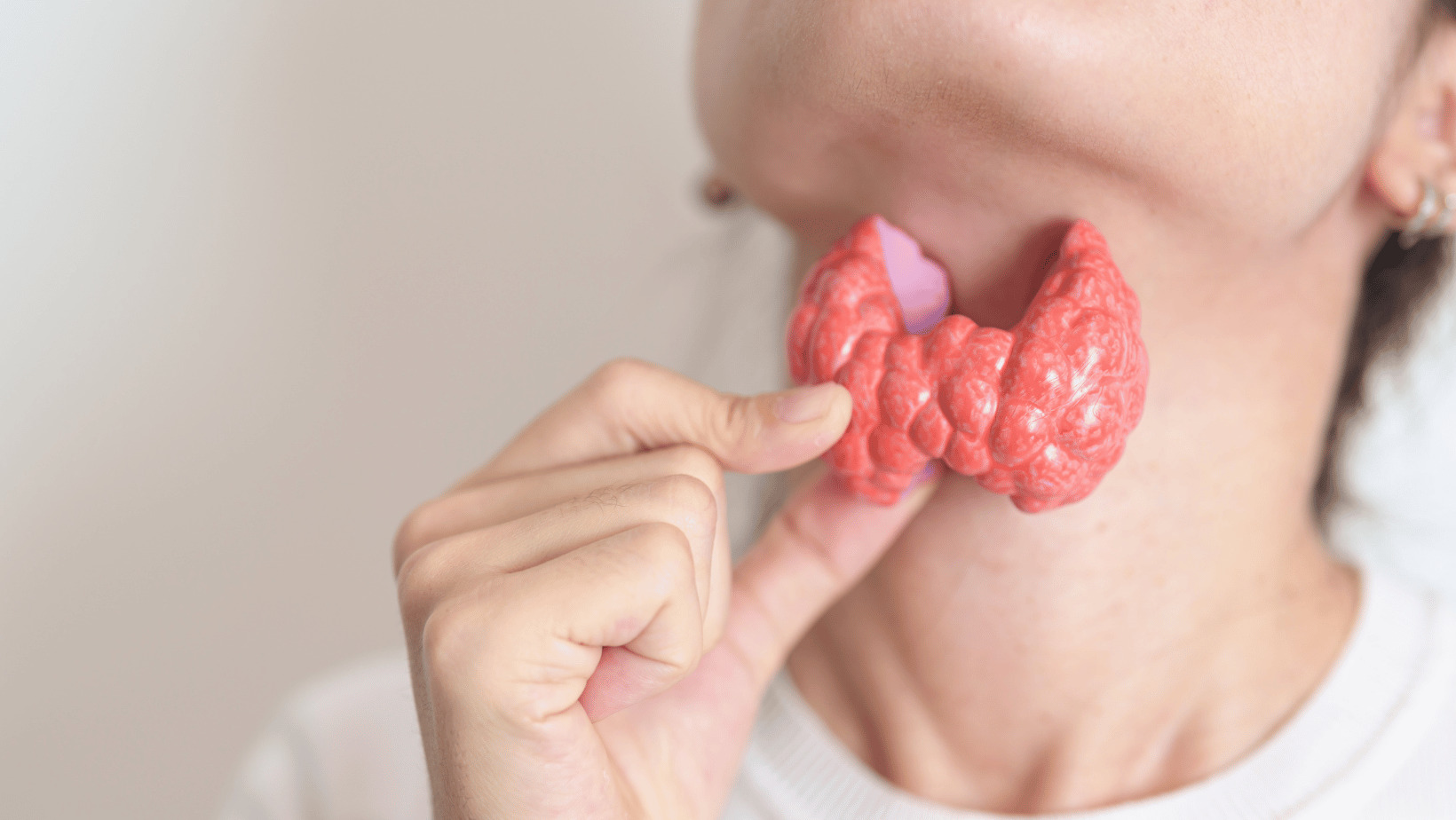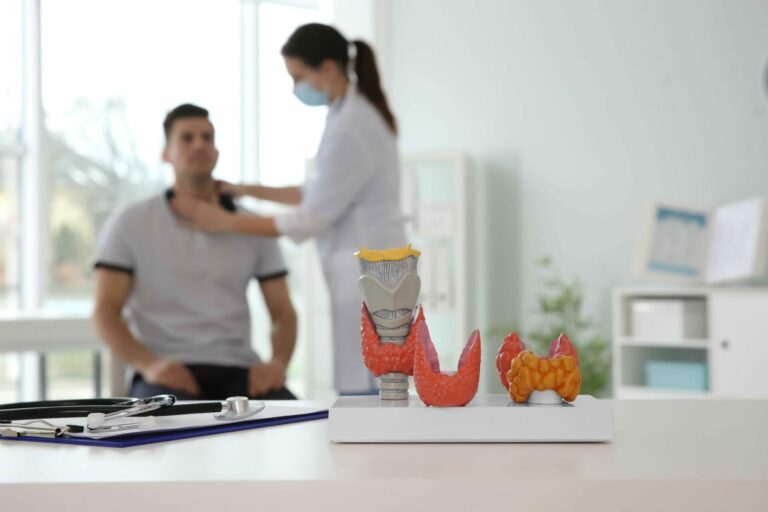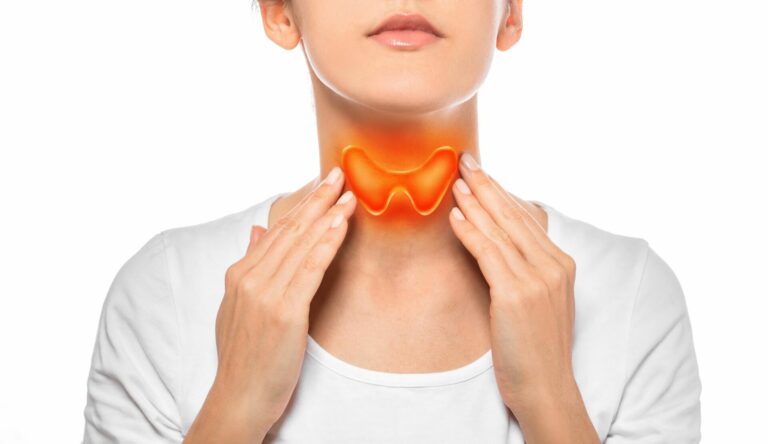Hashimoto's thyroiditis, also known as chronic lymphocytic thyroiditis or "Hashimoto"is a chronic inflammation of the thyroid gland. This is also called the butterfly organ. In this blog article, we summarize the most important facts about Hashimoto's for you, and give you numerous insights about the treatment and management of the disease.
Your natural Hashimoto mixture
With natural methods, such as the individual spagyric mixtures from Zimply Natural, complaints can be treated and sustainably alleviated.
Table of contents
- What does the thyroid gland do?
- How does Hashimoto develop?
- What symptoms can occur with Hashimoto's?
- Who does the disease affect and when does it occur?
- Can Hashimoto occur after pregnancy?
- Can Hashimoto's occur from a corona infection?
- How can Hashimoto's sufferers be helped?
- Do's and don'ts with Hashimoto's disease
- Q&A: Everything you need to know about Hashimoto's in a nutshell
- Zimply Natural as your natural way back to wellness
- Learn even more about Hashimoto in our free webinar!
What does the thyroid gland do?
The thyroid gland (medical term: thyroid gland) is a vital, small hormone gland located in the front of the neck below the larynx that produces vital thyroid hormones. It is essential for metabolism, growth and maturation of the body and involved in the regulation of various bodily functions. It continuously releases a certain amount of thyroid hormones into the blood. As soon as the MetabolismWhen the body needs more energy, for example in cold weather, during growth or pregnancy, the thyroid cranks up its hormone production.
How does Hashimoto develop?
Hashimoto's thyroiditis, also known as chronic lymphocytic thyroiditis, is an autoimmune disease in which the immune system attacks the thyroid gland and causes damage. The exact cause of Hashimoto's thyroiditis is not fully understood, but it is believed that several factors may contribute to the development of this disease:
Genetic predisposition: There is evidence that a genetic predisposition may play a role. If first-degree relatives (parents, siblings) have Hashimoto's thyroiditis, the risk of developing the disease increases.
Environmental factors: Some environmental factors, such as exposure to certain viruses or infections, could affect the immune system and contribute to the development of Hashimoto's.
Hormonal changes: It is thought that hormonal changes, especially in women during pregnancy or after childbirth, can trigger or worsen Hashimoto's.
Other autoimmune diseases: People who already have other autoimmune diseases, such as type 1 diabetes or rheumatoid arthritis, may have an increased risk of also developing Hashimoto's thyroiditis.
Hashimoto's thyroiditis leads to gradual destruction of the thyroid gland, affecting thyroid function over time. This can lead to hypothyroidism (underactive thyroid), in which the thyroid gland does not produce enough hormones. The condition is usually diagnosed through blood tests and imaging, and treatment usually involves replacing missing thyroid hormones with medications to balance hormone levels in the body.
...as a result, those affected have an increased need for protein? The German Nutrition Society (DGE) recommends 0.8 g of protein per kilogram of body weight for a healthy person who is normally active in sports. For Hashimoto's patients, the recommendation is 1.5g of protein per kilogram of body weight.
What symptoms can occur with Hashimoto's?
Hashimoto's thyroiditis can cause a variety of symptoms because it leads to hypothyroidism, when the thyroid gland does not produce enough hormones. Symptoms can vary from person to person and may occur gradually. Typical signs and symptoms of Hashimoto's thyroiditis are:
Tiredness and fatigue: One of the most common complaints is persistent fatigue, even after adequate sleep.
Weight gain: Many people with Hashimoto's thyroiditis have difficulty losing weight or even gain weight unintentionally.
Sensitivity to cold: Sufferers often feel colder than others, even in normal temperatures.
Constipation: Slow digestion and constipation may occur.
Dry skin and hair: Skin and hair can become dry and brittle.
Muscle pain and weakness: Muscle pain and weakness may occur.
Depression and decreased mental acuity: Many people experience mood swings, depression and memory problems.
Menstrual disorders: Women may experience irregular menstrual cycles and increased menstrual bleeding.
Hair loss: Thinning hair and hair loss may occur.
Bradycardia: A slowed heartbeat (bradycardia) may be a consequence.
It is important to note that not all people with Hashimoto's thyroiditis have all these symptoms. Some people may have only mild symptoms or even be asymptomatic. If you suspect you have Hashimoto's thyroiditis or notice symptoms of the condition, it is important to see a doctor. A blood test that measures thyroid hormone levels and thyroid antibodies can be done to diagnose this condition. Proper treatment can help relieve symptoms and normalize thyroid function.
Who does the disease affect and when does it occur?
Hashimoto's thyroiditis is one of the most common forms of hypothyroidism in adults and affects about five to ten percent of the population. It usually occurs between the ages of 30 and 50.
Women are affected about nine times more often than men, with the first symptoms often occurring at the same time as menopause. As a result, thyroiditis easily goes unnoticed because the symptoms are attributed to menopause.
Can Hashimoto occur after pregnancy?
If you have recently become a mother, it is important to keep an eye on your hormone and thyroid levels, as the risk of Hashimoto's is increased after pregnancy. During pregnancy, your body goes through many hormonal changes that can affect your immune system. Normally, the thyroid should return to normal after birth, but there are cases where the onset of hypothyroidism occurs after birth, which can lead to Hashimoto's if left untreated.
So if you suffer from fatigue, hair loss, weight changes or postpartum depression after pregnancy, you should see a doctor and have your thyroid levels checked. Especially if you suffer from diabetes or elevated thyroid antibodies were detected before or during pregnancy, caution is advised.
About 7% of all women develop autoimmune hypothyroidism postpartum. The diagnosis is often made very late, because persistent exhaustion, irritability or insomnia is often associated with "baby blues" in the new stressful situation.
Be patient, your body needs to recover from the pregnancy. If symptoms such as increased sweating, listlessness and increased irritability last longer than a year, you should definitely discuss this with your doctor.
Can Hashimoto's occur from a corona infection?
The Corona pandemic has turned our lives completely upside down. While most people nowadays take a covid infection comparatively calmly, there is a part of the population that has to deal with after-effects of COVID-19: People with Hashimoto's thyroiditis. According to a German study, the risk of an autoimmune disease such as Hashimoto's or Graves' disease is increased by 43% in all age and gender groups after a Corona infection. Particularly after a severe course, caution is advised.
Since COVID-19 can attack not only the lungs but also the immune system, it is conceivable that Hashimoto's patients have a higher risk of developing corona and suffering complications. In addition, an infection with the coronavirus can overwhelm the immune system and lead to an exacerbation of Hashimoto's symptoms. Affected individuals may also have an increased risk of developing Hashimoto's inflammation associated with COVID-19.
How can Hashimoto's sufferers be helped?
People with Hashimoto's thyroiditis can be helped by a variety of measures and treatments to relieve their symptoms and improve their quality of life. Here are some ways Hashimoto's sufferers can be helped:
Drug treatment: The main treatment for Hashimoto's thyroiditis is usually to replace missing thyroid hormones with medication. The most commonly prescribed medication is levothyroxine. The dosage is adjusted individually to balance the thyroid hormone levels in the body.
Regular medical care: People with Hashimoto's should have regular medical checkups and blood tests to make sure their thyroid hormone levels are properly adjusted and to detect any changes early.
Healthy eating: A balanced diet can help promote overall well-being. Some people with Hashimoto's report an improvement in their symptoms when they avoid foods containing gluten or adjust their diet in other ways. A dietitian can help develop an appropriate nutrition strategy.
Stress Management: Stress can worsen the symptoms of Hashimoto's thyroiditis. Stress management methods such as relaxation exercises, meditation and regular exercise can be helpful.
Motion: Regular physical activity can improve overall well-being and elevate mood. It is important to adapt physical activity to the individual fitness level.
Sleep: Adequate sleep is critical for thyroid health and overall well-being. Sleep disorders should be addressed and treated.
Adjunctive therapies: Adjunctive therapies may be considered as needed to treat specific symptoms. This may include treatment for depression, anxiety, or other accompanying health issues.
Information and self-management: Education about the disease is important to help sufferers better understand and manage their symptoms. Support groups and online resources can provide useful information and support.
Treatment and support for people with Hashimoto's thyroiditis should be individualized, as symptoms and needs can vary from person to person. It is critical to work closely with a qualified physician or endocrinologist to provide the best possible care and treatment.
Do's and don'ts with Hashimoto's disease
Do's - What you are welcome to do for support
- A diet rich in omega-3 with little iodine
At best, iodine should only be taken in small doses. A diet rich in omega-3 can also be helpful due to its anti-inflammatory effect. The trace element selenium, which is found in foods such as meat, fish, eggs, lentils and mushrooms, can also have a positive effect.
- Strengthen your gut flora with probiotics and prebiotic foods
The intestinal flora can be supported by probiotics, viable strains of bacteria that promote the digestion of fats, carbohydrates and proteins. Probiotics are found, for example, in sauerkraut, yogurt, pickles, tempeh, kimchi, cheese, apple cider vinegar, kombucha, kefir and miso soups. Leeks, garlic and fermented foods like kefir or sauerkraut are especially prebiotic foods that has a super positive effect on your gut flora. They are also available as dietary supplements, in the form of capsules and powders.
- What fruit for Hashimoto?
Low-sugar and low-acid fruit is particularly suitable here, so as not to further promote inflammatory processes. While apples, pears and berries are a good choice, mango, banana or cherries are less recommended. - Healthy fats and oils for your body
Build healthy fats and oils into your diet. You can find healthy fats in nuts or sesame seeds. High-quality olive, avocado, coconut or linseed oil are particularly recommended.
- Make sure you have a good vitamin D intake
Because of the vitamin D deficiency often present in those with the disease, it is recommended to spend at least 5 minutes outside without sunscreen and with free forearms and face. Sunscreen with a too high SPF factor and strong UV-blocking day creams can increase the vitamin D deficiency. Especially in winter, vitamin D should be supplied externally through capsules or drops
- Move!
Physical activity can help you reduce stress and increase your well-being.
Frequently, Hashimoto's sufferers have a vitamin D deficiency and gluten intolerance. In addition, too high iodine levels can probably aggravate the disease if there is already a genetic predisposition or cause it to break out prematurely. In addition, healthy intestinal flora is crucial for a healthy immune system, as our immune cells are predominantly located in the intestines. Accordingly, diet is an important factor in alleviating Hashimoto's symptoms.
Dont's - These are the things you should not do
- Cereals containing gluten, soy and dairy products
Due to the frequent parallel occurrence of gluten intolerance or gluten sensitivity, avoiding gluten-containing cereals such as wheat, rye, barley and spelt could provide relief. Pseudocereals such as buckwheat, amaranth and quinoa offer a possible substitute. However, when someone is diagnosed with Hashimoto's, it does not necessarily mean that they cannot tolerate gluten. A direct link between Hashimoto's and gluten was published a few years by an American study in 2010 without sufficient evidence and corrected two years later by a Scandinavian study to no proven link between Hashimoto's and gluten.
Soy is considered an irritant to it thyroid gland and can block thyroid hormones. It is one of the most difficult proteins to digest, which is why it should be avoided in Hashimoto's. Dairy products are also suspected of inhibiting thyroid hormones, which is why sufferers should also consume them only in moderation. - Alcoholic and sugary drinks
Don't forget to watch your beverage choices as well. Avoid sugary drinks and alcohol, as these also promote inflammation in the body. You should also refrain from smoking.
Q&A: Everything in a nutshell - What you need to know about Hashimoto's disease
How is Hashimoto diagnosed?
If there are signs of thyroid disease, the thyroid gland is palpated first and may also be examined in more detail by ultrasound.
Hashimoto's thyroiditis is finally diagnosed by means of a blood test. On the one hand, this measures the so-called thyroid levels, i.e. the thyroid hormones themselves as well as thyroid-stimulating hormone (TSH), which is produced in the pituitary gland and controls the function of the thyroid gland. On the other hand, the blood is examined for typical antibodies directed against the thyroid tissue.
Since Hashimoto's thyroiditis can occur together with other autoimmune diseases, additional tests may be performed to detect them. Examples include tests for gluten intolerance (celiac disease) or diabetes mellitus.
How is Hashimoto treated hormonally?
The goal of treatment for Hashimoto's is to restore thyroid function as well as possible by taking hormone supplements. These hormone supplements should be taken regularly or daily to keep the hormone level stable and prevent possible complications. Usually, the synthetic thyroid hormone L-thyroxine is prescribed. Your doctor should also monitor thyroid levels regularly and adjust the dosage if necessary to make sure they remain in the optimal range.
Can Hashimoto's be cured?
Contrary to a widespread theory, the chronic autoimmune disease is not completely curable from a conventional medical point of view. Hormone preparations, which may have to be continuously adjusted to hormonal fluctuations and surges, can compensate for the deficiency of thyroid hormones and thus symptoms, but they cannot remedy the causative autoimmune disease.
How reliable are self-tests and online questionnaires for Hashimoto's?
Self-tests for Hashimoto's thyroiditis, available online or in pharmacies, can be used as screening tools to measure certain thyroid parameters such as antibodies or hormone levels. These self-tests are not considered definitive diagnostic tools, but rather supplemental. Online questionnaires can also only provide clues to Hashimoto's. For a reliable diagnosis and appropriate treatment of Hashimoto's thyroiditis, a medical examination and comprehensive blood tests are necessary.
What is the Hashimoto lie?
The term Hashimoto's lie is not a term used by the orthodox medical community or science. Rather, it has formed from the colloquial space and can be interpreted differently, but mostly to criticize certain statements or views in connection with Hashimoto's thyroiditis. As representatives Youtuber, concerning in addition, welfare practical men and physicians are to be specified. They have different opinions, e.g. that the disease Hashimoto does not really exist or is completely curable by a lectin-free diet (proteins that bind to carbohydrates, which is contained in many vegetables such as tomatoes).

By the way, the application of your thyroid spray is very simple: The spray is simply sprayed into the mouth according to the dosage instructions on the bottle. In order to achieve the best possible effect and to be able to optimally counteract the causes, we recommend using the spray over a longer period of at least six to eight weeks. As a kind of cure, you spray 3×3 sprays daily.
Zimply Natural as your natural way back to wellness
It has been known for thousands of years that Mother Nature can help with almost any ailment. Zimply Natural offers you a practical way to incorporate powerful medicinal plants into your treatment in a way that is as suitable and comprehensive as possible for everyday use. Here you can have the healing power of the plants in a spray created individually based on your physical condition and tailored to your complaints. Because you deserve more than standard preparations off the shelf! Book an appointment with our alternative practitioner Tobias and create your own spray with an individual recipe. Alternatively, you can also order our thyroid spray. The formula of our Thyroid Complex was selected and created from over 75,000 Zimply Natural formulas. You can easily spray your spray into your mouth. It contains plant extracts and spagyric essences, which have a positive effect against symptoms of thyroid disease, and many other ingredients that help to optimally support your well-being.
Your natural Hashimoto mixture
With natural methods, such as the individual spagyric mixtures from Zimply Natural, complaints can be treated and sustainably alleviated.
You can find these medicinal plants in your Hashimoto's recipe
The antiviral and anti-inflammatory blend can help you manage thyroid disease symptoms naturally. Learn more in our Plant encyclopedia more about the power of medicinal plants!
Learn even more about Hashimoto in our free webinar!
In this webinar, we will delve into the world of this common autoimmune thyroid disease together. The informative journey will go from the basics to symptom management. Of particular interest: the psychological causes.
Whether you are affected yourself or want to expand your knowledge, our speaker Kristine A. Fredriksson will show the effects on the body and natural ways to relieve and improve quality of life, important medicinal plants and a exclusive formula as appreciative support included.
We are looking forward to you and your participation!
Here come You to the registration! You will receive the video directly!













